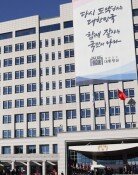[Op-Ed] Lobbyist Lawmakers
Lobbyists schmooze with policymakers, political parties and lawmakers to influence public policies or legislation on behalf of a specific group. They are paid, of course. Certain developed countries have legalized the lobbying system, but lobbyists must register and report to authorities in advance what they do and for whom they work. An estimated 35,000 lobbyists are registered in the U.S. Congress, and if those unregistered are included, the number rises to around 100,000. The lobbyists are said to make a combined 1.5 billion dollars, far exceeding the annual revenue of a moderate-size global company.
In Britain in the mid-1990s, journalists of a leading magazine set up a paper company and lobbied more than 500 members of parliament in a type of sting operation. Only two lawmakers fell into the trap. They received thousands of dollars in return for making comments representing the paper companys interests. Every single detail was unveiled to the world. The two lawmakers were banned from parliament for several months and got pay cuts. This is because they failed to properly report the revenue to parliament, not because they were lobbied.
In Koreas 17th National Assembly session, a movement was started to legalize lobbying. A bill was proposed and discussions took place to legalize lobbying, which was brisk underground, and curb corruption and bribery. The effort to publicly discuss the matter failed, however, because of skepticism that the system was inappropriate for Korea. Lawyers associations are also dead set against the legalization of lobbying. Though lobbying is illegal in Korea, it takes place nonetheless. This could be why so many lawmakers take one side when it comes to matters such as agricultural reform, regulation of private institutions, and law schools.
The law firm where main opposition Democratic Party lawmaker Jeon Hyun-hee is a partner is said to have dominated the lawsuits that several hospitals filed against the National Health Insurance Corp. to get costs for medicine reimbursed. The hospitals sought reimbursement of 31.8 billion won (25.36 million dollars), of which the firm handled 31.35 billion won (25 million dollars), or 98.6 percent. Jeon is part of the Health, Welfare and Family Affairs Committee of the National Assembly. She said she is unrelated to this case, saying she handed over her job as partner to someone else, but the handover is yet incomplete. It is hard to say, however, that the law firm dominated the lawsuit simply by chance. How a lawmaker can still work as a lawyer remains disputed, but this is apparently not a big deal since so many former lawyers are lawmakers.
Editorial Writer Lee Jin-nyong (jinnyong@donga.com)







